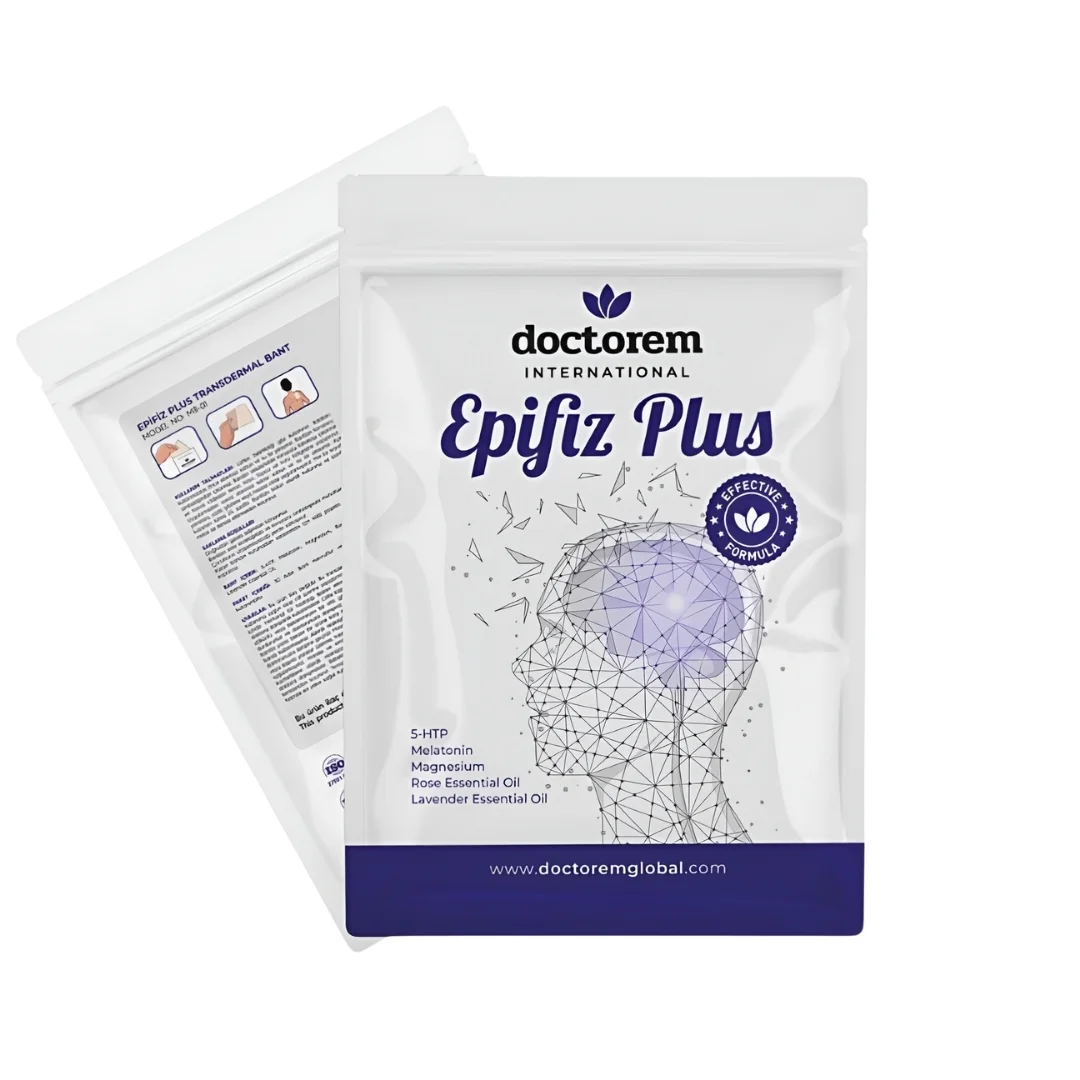Doctorem Epiphysis Plus Tape: Innovative Solution for Quality Sleep and Balance
The stressful pace of modern life can disrupt our sleep patterns and general balance. Doctorem Epifiz Plus band comes into play at this point, offering an innovative solution for quality sleep and balance. In this article, we will examine in detail what Epifiz Plus is, its benefits and how to use it.
What Does Doctorem Epifiz Plus Do?
Doctorem Epiphysis Plus tape is an innovative health product that uses transdermal technology. Designed as a TTS (Transdermal Therapeutic System) patch, this product delivers the active ingredients it contains to the body through the skin. Each box contains 30 patches and each patch is effective for 24 hours.
What Does Epiphysis Plus Do?
Epifiz Plus aims to improve sleep quality and maintain body balance. Thanks to the ingredients it contains:
- Helps improve sleep patterns
- Aims to reduce stress and anxiety
- Helps regulate body rhythm
- Aims to improve your overall quality of life
How to Use Epifiz Plus?
- Choose a clean, dry area of skin (for example, upper arm, shoulder, or back)
- Remove the tape from its packaging and peel off the protective layer
- Attach the tape to the area of your choice
- Keep the tape in place for 24 hours
- At the end of the period, gently remove and discard the tape
Important: Wait at least 1 week before using the same skin area again.
Ingredients, Benefits and Scientific Foundations
Doctorem Epifiz Plus contains beneficial components for sleep and balance. Here are the ingredients, their potential benefits and the scientific research supporting them:
- 5-HTP (5-Hydroxytryptophan)
- Benefit: It improves mood and sleep quality by increasing serotonin production.
- Scientific Basis: Clinical studies have shown that 5-HTP improves sleep quality and shortens the time it takes to fall asleep [1].
- Melatonin
- Benefit: Regulates the sleep-wake cycle and improves sleep quality.
- Scientific Basis: It has been proven by meta-analyses that melatonin improves sleep disorders and reduces jet lag symptoms [2].
- Magnesium
- Benefit: Calms the nervous system and helps muscle relaxation.
- Scientific Basis: Studies have shown that magnesium supplementation improves sleep quality and reduces insomnia symptoms [3].
- Rose Essential Oil
- Benefit: It has a relaxing and calming effect.
- Scientific Basis: It has been supported by clinical studies that rose oil reduces anxiety and stress [4].
- Valeriana Officinalis (Valerian)
- Benefit: It has a calming effect and improves sleep quality.
- Scientific Basis: It has been shown by meta-analyses that valeriana root extract improves sleep quality and shortens the time to fall asleep [5].
- Withania Somnifera (Ashwagandha)
- Benefit: Reduces stress and anxiety, improves sleep quality.
- Scientific Basis: Clinical studies have proven that Ashwagandha reduces stress and anxiety and improves sleep quality [6].
- Lavender Essential Oil
- Benefit: It has a relaxing and calming effect.
- Scientific Basis: Studies have shown that lavender oil reduces anxiety and improves sleep quality [7].
- Pyridoxine (Vitamin B6)
- Benefit: Supports serotonin and melatonin production.
- Scientific Basis: Vitamin B6 has been shown to have positive effects on dream recall and sleep quality [8].
- Uncaria Rhynchophylla (Cat's Claw)
- Benefit: It has a calming and sleep-regulating effect.
- Scientific Basis: This plant, used in traditional Chinese medicine, has been shown to have neuroprotective and calming effects [9].
All these components are delivered to the body through the transdermal drug delivery system (TTS) of Doctorem Epifiz Plus. The effectiveness of this method is supported by research showing that it can be effective in delivering various ingredients to the body [10].
These scientific findings support the potential benefits of the ingredients contained in Epifiz Plus. However, it is important to remember that every individual is different and results may vary from person to person.
Sources:
- Birdsall TC. (1998). 5-Hydroxytryptophan: a clinically-effective serotonin precursor. Alternative Medicine Review, 3(4), 271-280.
- Ferracioli-Oda E, et al. (2013). Meta-analysis: melatonin for the treatment of primary sleep disorders. PLoS One, 8(5), e63773.
- Abbasi B, et al. (2012). The effect of magnesium supplementation on primary insomnia in elderly: A double-blind placebo-controlled clinical trial. Journal of Research in Medical Sciences, 17(12), 1161-1169.
- Mohebitabar S, et al. (2017). Therapeutic efficacy of rose oil: A comprehensive review of clinical evidence. Avicenna Journal of Phytomedicine, 7(3), 206-213.
- Bent S, et al. (2006). Valerian for sleep: a systematic review and meta-analysis. The American Journal of Medicine, 119(12), 1005-1012.
- Langade D, et al. (2019). Efficacy and Safety of Ashwagandha (Withania somnifera) Root Extract in Insomnia and Anxiety: A Double-blind, Randomized, Placebo-controlled Study. Cureus, 11(9), e5797.
- Lillehei AS, et al. (2015). Effect of Inhaled Lavender and Sleep Hygiene on Self-Reported Sleep Issues: A Randomized Controlled Trial. Journal of Alternative and Complementary Medicine, 21(7), 430-438.
- Aspy DJ, et al. (2018). Effects of Vitamin B6 (Pyridoxine) and a B Complex Preparation on Dreaming and Sleep. Perceptual and Motor Skills, 125(3), 451-462.
- Zhang Q, et al. (2019). Neuroprotective effects of the rhynchophylline in the hippocampus through the PI3K/Akt/GSK-3β signaling pathway. Neurochemical Research, 44(7), 1810-1820.
- Prausnitz MR, Langer R. (2008). Transdermal drug delivery. Nature Biotechnology, 26(11), 1261-1268.

